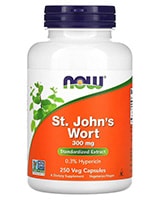

Overview
St. John’s Wort, scientifically referred to as Hypericum perforatum L., is a flowering shrub primarily native to Europe. Named after the birthday of John the Baptist due to its flowering time, it’s renowned for its vibrant yellow flowers. Traditionally used in various medicinal applications, its leaves and flowers contain hyperforin, an active compound. Available in forms like teas, tablets, and topicals, it’s utilized mainly for depression and menopausal symptoms.
The plant’s cultural history is intriguing, dating back to ancient Greece and later as a talisman in the Middle Ages—a usage rooted more in superstition than scientific fact. Modern herbal medicine, especially after key studies in the late 1990s, recognizes St. John’s Wort as a significant antidepressant herb.
St. John’s Wort and Anxiety
St. John’s Wort is effective against anxiety by influencing key neurotransmitters in the brain, particularly increasing the levels of serotonin, dopamine, and norepinephrine. This action is pivotal in mood regulation, thereby alleviating anxiety symptoms. Clinical studies, including those conducted in Germany, have demonstrated its efficacy in improving anxiety symptoms, underscoring its potential as a therapeutic alternative to conventional anxiety treatments.
St. John’s Wort for Depression

St. John’s Wort, particularly effective in treating mild to moderate depression, functions by increasing neurotransmitter levels in the brain, including serotonin, dopamine, and norepinephrine. This elevation in neurotransmitters is crucial for improving mood and emotional stability. Comparative studies have shown its effectiveness to be on par with certain prescription antidepressants, though its impact on severe depression is less certain. Given its interactions with various medications, its use, especially alongside antidepressants, should be closely monitored by healthcare professionals.
Benefits
The therapeutic applications of St. John’s Wort extend beyond mental health. It has demonstrated significant effectiveness in alleviating menopausal symptoms, such as hot flashes, and in treating somatic symptom disorder, which involves severe anxiety about physical symptoms. The plant’s active ingredients, like hypericin and hyperforin, contribute to its wide-ranging benefits, including antioxidant, antiviral, and antibacterial properties. Despite these diverse benefits, it’s crucial to use St. John’s Wort under medical supervision due to potential interactions and to ensure its safe and effective use.
Side Effects
While St. John’s Wort is generally considered safe when taken orally and in appropriate doses, it’s not without side effects. Users may experience agitation, anxiety, dizziness, gastrointestinal discomforts like diarrhea and constipation, and dry mouth. Some may also report fatigue, insomnia, headaches, and increased sensitivity to sunlight. Given these potential side effects, individuals need to approach its use cautiously and under medical supervision, especially those with pre-existing health conditions or who are taking other medications.
Interactions
St. John’s Wort interacts with a wide range of medications, potentially altering their effectiveness. This includes antidepressants, which can lead to an excessive accumulation of serotonin, barbiturates, certain chemotherapy drugs, immunosuppressive drugs, statins, contraceptives, and various others. These interactions can lead to reduced efficacy of these drugs or increased risk of adverse effects. Therefore, it is crucial to consult healthcare providers before combining St. John’s Wort with any other medication to avoid undesirable interactions.
In addition to prescription medications, St. John’s Wort can also interact with over-the-counter drugs and herbal supplements. This underscores the necessity of informing healthcare providers about all substances being taken, including herbal supplements like St. John’s Wort. Due to its wide range of interactions and potential side effects, St. John’s Wort is not recommended during pregnancy or breastfeeding and may not be suitable for individuals with certain medical conditions. This reiterates the need for medical advice before starting or continuing its use.
Dosage
The appropriate dosage of St. John’s Wort varies depending on the condition being treated, the form of the supplement (tea, tablet, etc.), and individual factors like age and overall health. Generally, for depression, dosages range from 300 to 600 mg taken orally three times a day. However, it’s imperative to follow the specific dosage recommended by a healthcare provider or as directed on the product label. Overdosing can lead to increased side effects and decreased effectiveness.
St. John’s Wort Before Bed
Using St. John’s Wort before bed can aid in improving sleep patterns, particularly for those dealing with mild depressive symptoms. However, since its impact on sleep can vary from person to person, it’s advisable to monitor its effects and consult with a healthcare professional to determine the best time for its intake.
How Long Does St. John’s Wort Take to Work?
The time it takes for St. John’s Wort to exhibit its effects can vary. Generally, individuals may begin to notice improvements in symptoms of depression or anxiety within two to four weeks of regular use. However, the full benefits might take longer to manifest. This timeframe can depend on various factors, including the severity of the condition, dosage, and individual response to the herb. Therefore, patience and consistency in its use are essential, along with regular monitoring by a healthcare provider.
St. John’s Wort for Menopause

St. John’s Wort has been found beneficial in managing menopausal symptoms, particularly hot flashes and mood swings. Some studies suggest that it can be effective when used alone or in combination with other herbs like black cohosh. However, due to its interactions with other medications and potential side effects, women considering St. John’s Wort for menopause relief should do so under the guidance of a healthcare professional.
Conclusion
In summary, St. John’s Wort, or Hypericum perforatum L., stands out as an herbal remedy with a rich history and diverse applications, notably in treating depression, anxiety, and menopausal symptoms. While its benefits are significant, it’s crucial to approach its use with caution due to potential side effects and interactions with other medications, including prescription drugs, over-the-counter medications, and herbal supplements. Given these considerations and the varying individual responses to its use, it is essential to seek medical guidance before starting or continuing treatment with St. John’s Wort. This holistic approach ensures the safe and effective utilization of this potent herb.
Buy St. John’s Wort Online Review Comparison Table
| Product | Company | Quantity | Price | Country | Website |
 St. John's Wort Capsules | iHerb | 100 pills (300mg) | $10.34 |  Worldwide, AU | Visit Website >> |

Leave a Reply